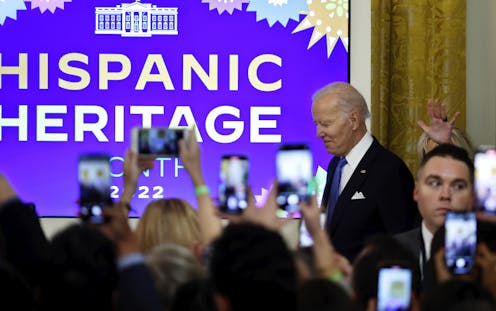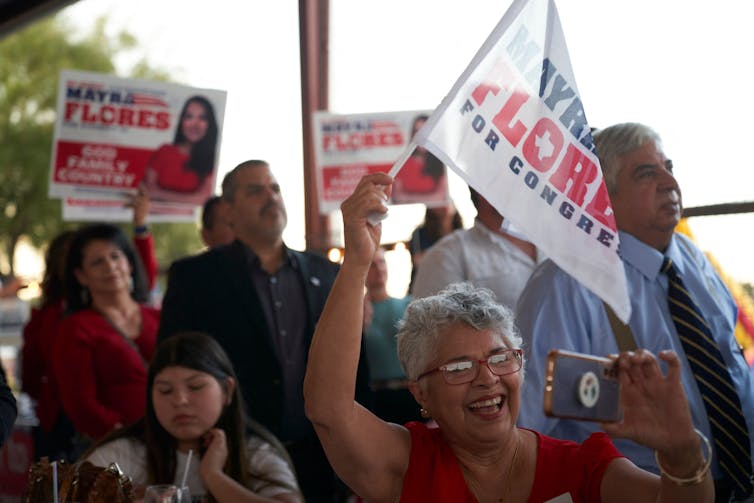
As the second largest U.S. demographic group, Latinos are a significant political force that could determine the elections in the key midterm battleground states of Arizona, Colorado and Nevada.
Not surprisingly, the anticipated impact of Latino voters has forced Democrats and Republicans to develop messages that not only resonate but also drive turnout on Election Day.
That is easier said than done.
Latino voters represent a diverse group of countries of origin, native languages, cultural values, education and personal characteristics. As with any demographic group, voting patterns are informed by individual experiences.
One thing is clear. Latino voters are turning out in record numbers.
In 2020, Latinos cast an estimated 16.6 million votes, an increase of 30.9% over their turnout in the 2016 presidential election.
If Latino communities are to be adequately represented in our democracy, then the complexity of those communities needs to be understood.
The majority of Latinos still vote democratic
As a licensed social worker among Latino immigrant communities, I have seen how many have endured heightened discrimination against their families and communities since the election of Donald Trump in 2016. I also have seen how these experience shape their mental well being and political decision-making.
Under the Trump Administration, workplace raids, immigrant detentions and family separations at the border instilled a deep fear and trauma among many Latino immigrant communities.
In one study, for instance, researchers found that stress associated with Trump-era policies – and continued under the Biden Administration – correlated with poorer mental health status among Latino adults.
A majority of Latinos — an estimated 63% — supported President Joe Biden in 2020. But there was about an 8 percentage-point swing toward Trump compared to 2016. Based on exit polling data, a higher percentage of Latino voters – 32% – cast their ballot for Trump in 2020 than the 29% that did in 2016.
How did Trump, with his anti-immigrant and anti-Mexican rhetoric, garner increased support from Latino voters?

One reason may be that immigration policies only affect a subset of Latinos, most notably Mexicans, followed by Salvadorans, Guatemalans and Hondurans. Other Latino subgroups have fewer undocumented members or have clearer advantages for documented U.S. entry. As a result, immigration issues are less relevant to either of these voting groups.
For example, Puerto Ricans are U.S. citizens who are not required to navigate the immigration system when entering the country.
Cubans are another Latino subgroup that has special access to citizenship pathways not afforded to other immigrants.
Pew Research Center data suggests that 55% of Cuban Americans plan on or lean toward voting Republican in the midterm elections, compared to 24% of Mexican Americans and 22% of Puerto Ricans.
On the national level, Cuban Americans have less influence on elections as they represent only 4% of all Latinos and are mainly concentrated in Florida.
But in Florida, 28% of Latinos are Cuban, and as a result, getting the Cuban American vote may be essential to winning. In 2020, for instance, the Cuban American vote played a significant role in Trump winning the state over Joe Biden.
Similarly, approval of Biden varies by origin, with most Cuban Americans disapproving of Biden’s overall performance as president, while just about half of Mexican Americans and Puerto Rican voters disapprove of his performance.
Significant factors shaping Latino voters
A key factor is religion.
About 48% of Latinos report being Catholic, with 16% identifying as Evangelical. While about half of the general Catholic population self-describe as Republican or Republican-leaning, most Catholic Latinos – about 59% – lean toward Democratic candidates.
Conversely, 50% of Evangelical Latinos lean toward a Republican vote in the midterms.
As a key issue among religious voters, most Latinos believe abortion should be legal in some situations.
Another distinction among Latinos relates to whether being Hispanic or Latino is an important part of their identity.
According to the Pew Research Center, those who do indicate the Latino identity as important or very important are more likely (60%) to vote Democratic than those who place less importance on their Latino identity (45%).
Common issues that outweigh Latino partisanship
Not surprisingly, the top issues among Latino voters vary by political affiliation or leaning, though some common issues arose on each side.
A top priority across Latino voters is the economy, as indicated by 90% of Republican-leaning and 75% of Democratic-leaning Latinos.
Also of high importance is education, with 72% of Democratic-leaning and 66% of Republican-leaning Latinos highlighting this issue.
Among Latino voters who report leaning Democratic, other top issues of concern included health care – 80% – and gun policy – 71%. Republican-leaning Latinos further identified violent crime – 76% – and immigration –63% – as key issues.
As a broad group, Latinos believe that Democrats care more about their needs and work to earn their votes.
This belief aligns with the historical pattern of Latinos more frequently voting for Democratic candidates.
Yet, as with any diverse demographic group, Latino voters are weighing important issues with views and values that are informed by their own backgrounds, experiences and belief systems.
Mary Lehman Held works for the University of Tennessee, Knoxville. She receives funding from Fahs Beck Fund and the National Oceanic and Atmospheric Administration. She is affiliated with Mental Health America of the MidSouth, Catholic Charities of Tennessee, and Serving Immigrants.
This article was originally published on The Conversation. Read the original article.







